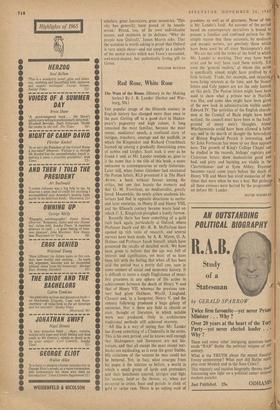Red Rose, White Rose
The Wars of the Roses. (History in the Making Series.) By J. R. Lander. (Seeker and War- burg, 50s.) THE popular image of the fifteenth century in English history has changed more than once in the past. Getting off to a good start in Shakes- peare's pageantry and high colour, it long remained the most familiar, because the most recent, mediaeval epoch, a confused story of intrigue, treachery, courage and the scaffold, in which the Kingmaker and Richard Crouchback loomed up among a gradually diminishing press of nobles and knights. Scott took it over as he found it and, as Mr. Lander reminds us, gave to it the name that is the title of this book, a name unknown to contemporaries or early historians. Later still, when James Gairdner had excavated the Paston letters, RLS presented it in The Black Arrow, a book without favour among the critics, but one that haunts the memory and that G. M. Trevelyan, no mediaevalist, greatly loved. Meanwhile, the newly arisen academic his- torians had fled in opposite directions to earlier and later centuries, to Henry II and Henry VIII, and the fifteenth century became waste land on which C. L. Kingsford ploughed a lonely furrow.
Recently there has been something of a gold rush back again, particularly at Oxford, where Professor Jacob and Mr. K. B. McFarlane have opened up rich veins of research, and several surveys have been made, by A. R. Myers, G. A. Holmes and Professor Jacob himself, which have presented the results of detailed work. We have been given to believe that the age was full of interest and significance, yet most of us have been left with the feeling that when all has been said the period was a pretty dull one, save in some corners of social and economic history. It is difficult to name a single Englishman of mani- fest greatness in any sphere of life active in achievement between the death of Henry V and that of Henry VII, whereas the previous cen- tury had given Ockham, Wyclif, Langland, Chaucer and, as a hangover, Henry V, and the century following produced a huge galaxy of eminence. Nor is there any field in church or state, thought or literature, in which notable work was produced. Only in architecture traditional methods still achieved mastery.
All this is a way of saying that Mr. Lander has drawn something of a Cinderella in the series. This is his own period, and he knows well enough that Shakespeare and Stevenson are not his- torians, and that all except the most recent text- books are misleading, as is even the great Stubbs. His criticisms of the sources he uses could not be bettered. Yet, in fact, what emerges from his pages is the mixture as before, a world in which a small group of lords and pretenders and their henchmen quarrel, intrigue and fight for money, land- or the throne, or, when not occupied in crime, feast and parade in cloth of gold or satins rare. There is an aching void of
goodness as well as of greatness. None of this is Mr. Lander's fault. An account of the period based on contemporary narratives is bound to present a familiar and confused pattern for the simple reason that these accounts, by mediocre and myopic writers, are precisely those which have been used by all since Shakespeare's day.
We are not told the terms of the brief to which Mr. Lander is working. They may have been strict and he may have read them strictly. Yet even the 'general readers,' at whom this series is specifically aimed, might have profited by a little latitude. Trade, for example, and shipping,' were living interests at the time, and the Stow:ir letters and Cely papers are not the only lantern on this path. The Paston letters might have been used to show what a private war in Norfolk was like, and some idea might have been given of the new look in administration visible under Edward IV. The activities of the English church- men at the Council of Basle might have been noticed; the council must have been in the back- ground of many men's thoughts. Abbot Whethamstede could have been allowed a fuller say, and in the dearth of thought the heterodoxy of Bishop Reginald Pecock is interesting, and Sir John Fortescue has more to say than appears here. The growth of King's College Chapel can be studied in the records, bishops' registers and Cistercian letters show monasteries good and bad, and piety and learning are visible in the Charterhouses and at Syon Abbey. Erasmus becomes vocal some years before the death Of Henry VII and More has vivid memories of the times that were when he was a boy. But perhape, all these avenues were barred by the programme set before Mr. Lander.
DAVID KNOWLES


















































 Previous page
Previous page